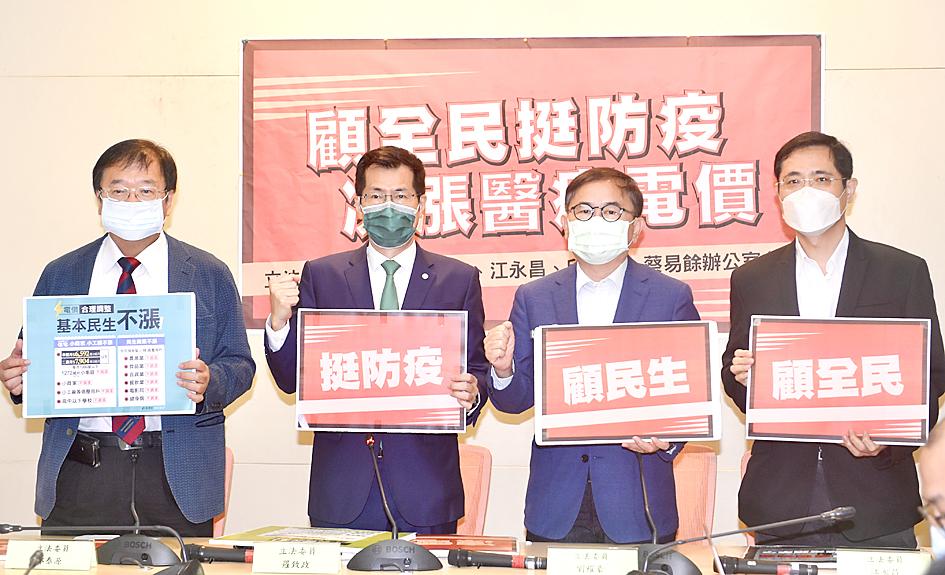Democratic Progressive Party (DPP) lawmakers yesterday called for a moratorium on raising hospital electricity rates.
The call came three days after the Ministry of Economic Affairs raised electricity prices by 8.4 percent for households and 15 percent for heavy users, starting today.
The state-run Taiwan Power Co (Taipower, 台電) said that increasing the rates is necessary to cut the utility’s losses amid soaring global energy prices.

Photo: George Tsorng, Taipei Times
DPP Legislator Lo Chih-cheng (羅致政) said that rates for hospitals should not be changed before the local outbreak of COVID-19 eases.
Much of the electricity used by hospitals is to power lifesaving and indispensable equipment, including life-support systems, scanning equipment and air-conditioners, he told a news conference in Taipei.
Doctors and nurses on the front line of COVID-19 pandemic deserve to work in comfort, without being bothered by power bills, he said.
DPP Legislator Chiang Yung-chang (江永昌) said that it is hard to accept that burdens are being created for hospitals so soon after medical workers helped the nation get through the worst of the pandemic.
The government already exempted a slew of energy consumers from the rate increases, including agricultural and fishing operations, food manufacturers, department stores, restaurants, movie theaters and gyms, he said.
“If you stop an ordinary Taiwanese on the street and ask them which sector should receive an exemption from electricity rate hikes, they would say hospitals before any of the six sectors designated by the Executive Yuan,” he said.
Raising the electricity rates for hospitals would not reduce Taipower’s deficits from years of offering cheap electricity, as hospitals use about 1 percent of the nation’s power supply, he said.
As hospitals have a key role in maintaining public health and the standard of living in Taiwan, they cannot be treated as just another enterprise that happens to use a lot of electricity, DPP Legislator Liu Chao-hao (劉櫂豪) said.
Raising the price of electricity for hospitals could lead to a decline in the quality of medical care received during a COVID-19 outbreak, especially for people living in rural areas, he said.
“Technology allows people to receive high-quality medical care today at the cost of increased electricity consumption,” DPP Legislator and Taiwan Medical Association president Chiu Tai-yuan (邱泰源) said.
Hospitals are already doing all that they can to save electricity, including turning off air-conditioners at offices, but they cannot do so in patients’ rooms, he said.
Operating COVID-19 quarantine wards and specialist care spaces requires a lot of electricity, he said, adding that medical workers appreciate the government’s financial assistance with energy bills in the past two years.
“A moratorium on electricity rate hikes would greatly help hospitals keep quality of care standards,” he said.

The Central Weather Administration (CWA) today issued a sea warning for Typhoon Fung-wong effective from 5:30pm, while local governments canceled school and work for tomorrow. A land warning is expected to be issued tomorrow morning before it is expected to make landfall on Wednesday, the agency said. Taoyuan, and well as Yilan, Hualien and Penghu counties canceled work and school for tomorrow, as well as mountainous district of Taipei and New Taipei City. For updated information on closures, please visit the Directorate-General of Personnel Administration Web site. As of 5pm today, Fung-wong was about 490km south-southwest of Oluanpi (鵝鑾鼻), Taiwan's southernmost point.

Tropical Storm Fung-Wong would likely strengthen into a typhoon later today as it continues moving westward across the Pacific before heading in Taiwan’s direction next week, the Central Weather Administration (CWA) said. As of 8am, Fung-Wong was about 2,190km east-southeast of Cape Oluanpi (鵝鑾鼻), Taiwan’s southernmost point, moving westward at 25kph and possibly accelerating to 31kph, CWA data showed. The tropical storm is currently over waters east of the Philippines and still far from Taiwan, CWA forecaster Tseng Chao-cheng (曾昭誠) said, adding that it could likely strengthen into a typhoon later in the day. It is forecast to reach the South China Sea

Almost a quarter of volunteer soldiers who signed up from 2021 to last year have sought early discharge, the Legislative Yuan’s Budget Center said in a report. The report said that 12,884 of 52,674 people who volunteered in the period had sought an early exit from the military, returning NT$895.96 million (US$28.86 million) to the government. In 2021, there was a 105.34 percent rise in the volunteer recruitment rate, but the number has steadily declined since then, missing recruitment targets, the Chinese-language United Daily News said, citing the report. In 2021, only 521 volunteers dropped out of the military, the report said, citing

Nearly 5 million people have signed up to receive the government’s NT$10,000 (US$322) universal cash handout since registration opened on Wednesday last week, with deposits expected to begin tomorrow, the Ministry of Finance said yesterday. After a staggered sign-up last week — based on the final digit of the applicant’s national ID or Alien Resident Certificate number — online registration is open to all eligible Taiwanese nationals, foreign permanent residents and spouses of Taiwanese nationals. Banks are expected to start issuing deposits from 6pm today, the ministry said. Those who completed registration by yesterday are expected to receive their NT$10,000 tomorrow, National Treasury